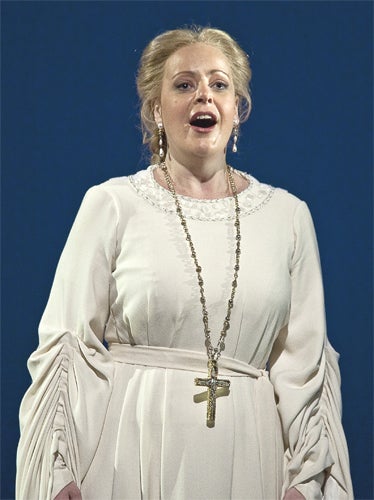A fight at the Opera
Lowry centre fears for its future when Royal Opera House moves north

Your support helps us to tell the story
From reproductive rights to climate change to Big Tech, The Independent is on the ground when the story is developing. Whether it's investigating the financials of Elon Musk's pro-Trump PAC or producing our latest documentary, 'The A Word', which shines a light on the American women fighting for reproductive rights, we know how important it is to parse out the facts from the messaging.
At such a critical moment in US history, we need reporters on the ground. Your donation allows us to keep sending journalists to speak to both sides of the story.
The Independent is trusted by Americans across the entire political spectrum. And unlike many other quality news outlets, we choose not to lock Americans out of our reporting and analysis with paywalls. We believe quality journalism should be available to everyone, paid for by those who can afford it.
Your support makes all the difference.It was heralded as the most exciting and costly new arts venture for a generation – the chance to bring world class opera and ballet to audiences far beyond the orbit of Covent Garden. But now, before the curtain has even gone up, the proposed scheme to create a permanent new base for the Royal Opera House (ROH) in Manchester has run into trouble.
Trustees of the Lowry arts centre, the glittering showpiece project which was completed just eight years ago with the help of £116m of public money, have demanded that the ROH plan be scrapped.
The Lowry chief executive Julia Fawcett yesterday wrote to the Culture Secretary Ben Bradshaw warning him that by going ahead with a new home in the city, the ROH would decimate its audiences and cost the centre £1.5m a year in lost ticket sales. Ms Fawcett said independently commissioned research demonstrated that The Lowry faced a 10 per cent shortfall in its total funding due to lost sales – threatening the jobs of the centre's 250 staff.
Under the ROH's plan, championed by the former BBC head of news Tony Hall, now the chief executive at Covent Garden, the organisation would spend £100m of public money refurbishing the Palace Theatre in Manchester to create its new northern home. It would then require up to £15m a year of public subsidy through the Arts Council of England and Manchester City Council to host a maximum of 16 Royal Opera performances and 31 by the Royal Ballet.
"We support the desire to extend the arts on offer in the north-west but we cannot support a proposal which threatens the very viability of The Lowry," said Ms Fawcett. The unprecedented statement followed an anguished meeting of the trustees last week in which the implications of the plan were discussed and the scheme was unanimously rejected.
The chairman of the board of trustees Rod Aldridge said that it would be "bad for Manchester, bad for the arts and bad for the taxpayer". He added: "It would destroy what we have achieved and would put the £116m of public money invested in the Lowry at severe risk."
The trustees want the plan to be radically overhauled with the Palace becoming the permanent home for opera and the Lowry the centre for ballet and dance.
But the ROH said it would press ahead with the proposals expressing "disappointment" at the warnings emanating from Salford which it said did not reflect the state of discussions among the parties. A spokeswoman said: "To deny the current proposal at this stage without those wider discussions taking place is premature, and the Royal Opera House remains convinced that there will be a solution that will bring great benefit, both artistically and economically, to Manchester and the greater north-west region."
While the vision, outlined last autumn, created excitement among opera and ballet audiences in the north of England, there are mounting concerns over the cost of the project as the state of public finances worsened. The replacement of Andy Burnham as Culture Secretary, a strong supporter of the plan and a Greater Manchester MP, with Mr Bradshaw has also changed the political dynamics behind the proposal.
It has led to some wondering privately whether the scheme could be shelved for a generation, just as it was when a similar plan was floated in the 1980s. A report commissioned by the Arts Council of England, which lavished praise on the scale of the ambition and the potential cultural benefits, published in March found that the scheme as it stood was "not yet viable".
Join our commenting forum
Join thought-provoking conversations, follow other Independent readers and see their replies
Comments